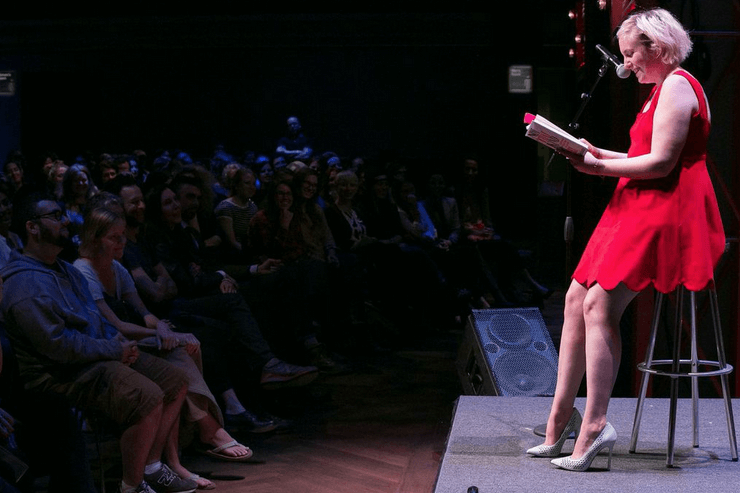On Lena Dunham, the Sexual Abuse Accusations, and the Importance of Telling Uncomfortable Stories


Lena Dunham reading at BAM
Photo by Beowulf Sheehan, courtesy of BAM
Yesterday, it was announced that Lena Dunham was canceling two of the dates on the European leg of her book tour. This announcement followed the accusation by a right-wing website that Dunham’s book includes descriptions of the author “sexually abusing her little sister,” as well as a series of tweets from Dunham in which she called the accusations “really fucking upsetting and disgusting” and admitted that she was in a “rage spiral” because while “usually this is the kind of stuff [she] can ignore” this accusation “demean[s] sufferers” and “twist[s her] words.”
Since its release a month ago, Dunham’s book has received overwhelmingly positive reviews (including one by me, in our sister publication The L Magazine), with certain of the book’s many personal anecdotes receiving far more media attention than others, i.e. when Dunham was raped by Barry, the resident mustachioed Oberlin college Republican, and Dunham’s descriptions of her time in therapy as an adolescent. But now, one part of the book which had not been touched upon by many reviews—the chapter devoted to Dunham’s relationship with her younger sister, Grace—is getting a great deal of attention, due in no small part to its inclusion in Kevin D. Williamson’s savage review of Dunham’s book in The National Review.
The chapter—from which Dunham read aloud at her recent BAM event—details everything from Grace’s excellent taste in shirts (a sartorial strength on display that night at BAM) to how Grace revealed she was gay to Dunham’s pretty much life-long attempts to understand the mysterious-to-her person who just so happened to also be her sister. The events which Dunham recounts in the book are, I think, recognizable—if not all necessarily personally familiar—to most people who, as children, were full of seemingly infinite questions about the people to whom they weirdly, wonderfully, randomly happened to be related. For many of us, these questions weren’t the kind that could be asked in any type of orthodox way—even if we were old enough or able to find the words to know how to ask. And so we explored. That is what childhood—and really all of life—is, after all: a mission to find things out. And because the part of this particular exploration that Dunham writes about happened when she was a 7-year-old, some of the things she describes—things like bribing Grace with “three pieces of candy if I could kiss her on the lips for five seconds”—are things that would—understandably and correctly, even—be more than a little worrisome if they were the actions of an adult, rather than a child.
But they aren’t the actions of an adult. Yes, Dunham writes that the things she did to Grace were things that “a sexual predator might do to woo a small suburban girl.” But Dunham also writes that she is an “unreliable narrator,” which—even though, yes, this is a memoir—is a pretty clear indication that not every single thing that Dunham recounts in the book can be taken as being absolutely what happened. Because, even in memoir, absolutes don’t exist; there is no “truth” with a capital T—especially when it comes to relating experiences that are 20 years old, and occurred when the narrator was a child. Which isn’t to say that I’m suggesting Dunham made up the stories at which Williamson and others are taking offense (though Williamson himself calls one story about Grace “especially suspicious”), rather that to take these anecdotes and pervert them for a very specific agenda (in Williamson’s case, it’s the idea that Dunham is an over-privileged, untalented left-wing liar with shitty parents) is unconscionable. When taken out of context from the rest of the book, yes, stories about 7-year-old Dunham looking at her baby sister’s vagina can—and, clearly, have—be twisted into proof that she was a disturbed child who manipulated her sibling’s body for her own purposes. Or, you know, you could actually read the book and take those moments for what they are: part of a larger portrayal of Dunham as a compulsively curious child, one who had relatively little limitations imposed—either internally or externally—on what she could explore. Did this extend to exploring her own body and those of people who were close to her? Sure. Is this the first time that a child has explored the body of another child? Absolutely not. But is it common for such an exploration to be openly written about, with the knowledge that it will be widely read? Not even close.
And therein lies part of the problem. Even if they don’t condemn 7-year-old Dunham’s actions, many people are now wondering why Dunham would even write about such things, and why any editor would let Dunham include this sort of experience in her book. Wouldn’t it, after all, just have been easier to edit that stuff out? Well, yes. It would have. It also would have been easier to edit out the fact that Dunham was drunk and on coke when she was raped by the college Republican. And it would have made for a better narrative for Dunham to forgo mentioning that her father went to Andover, thus further cementing Dunham’s reputation as being nothing more than an oblivious child of privilege. In fact, there are a lot of ways that Dunham could have sanitized her memoir, just as there are a lot of ways in which Dunham could make Hannah on Girls a more “likable” protagonist. But what we would all be losing if Dunham chose to do that is an essential truth that the lives people—and specifically women—lead are not all sanitized, and that we do not need to be likable or always do the right things in order to be worth listening to.
Maybe you’ll read Dunham’s book and think she seems like a terrible person. Maybe you won’t approve of or relate to choices she’s made or stories she tells. But to condemn her in this way is nothing less than an attempt to silence a woman who is telling a very specific, uncomfortable truth about herself, and so, by extension, it is an attempt to silence other people from doing the same thing. And that is inexcusable. Because what would be the point of a world full of writing in which the narrator is flawless and beyond reproach? We need to be exposed to the unflattering, the harsh, the ugly. Too many people are afraid to write that way, though. They are afraid that in doing so, they will be condemned as being nothing more than the darkest parts of themselves. And after seeing what’s happening to Lena Dunham, it’s easy to see why they feel that way. This is why it’s important to celebrate writing that tackles difficult subjects, pieces in which writers expose themselves as being imperfect and even flat-out wrong. It might, after all, be pretty to think that the world is full of people who always behave admirably and have never made the wrong decisions or acted in a questionable manner, but that has nothing to do with reality. Silencing those who attempt to give voice to uncomfortable truths does nothing to help anyone, least of all, those who most need to know that they’re not alone. Because the truth (lower case “t”) is that all of us are capable of bad decisions that can’t just be edited out for appearances, and they shouldn’t have to be.
Follow Kristin Iversen on twitter @kmiversen
You might also like 


























